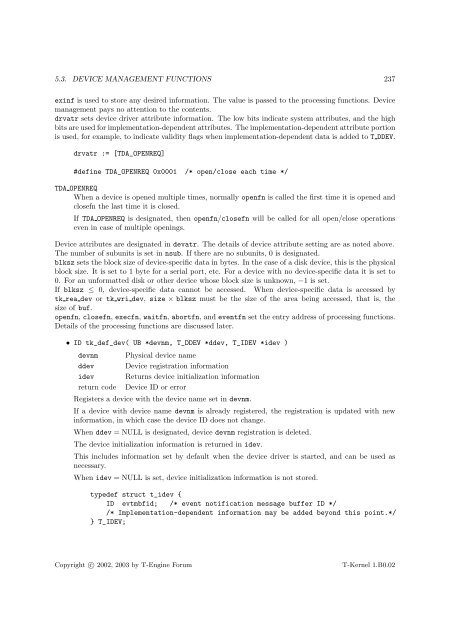T-Kernel Specification (1.B0.02)
T-Kernel Specification (1.B0.02)
T-Kernel Specification (1.B0.02)
Create successful ePaper yourself
Turn your PDF publications into a flip-book with our unique Google optimized e-Paper software.
5.3. DEVICE MANAGEMENT FUNCTIONS 237<br />
exinf is used to store any desired information. The value is passed to the processing functions. Device<br />
management pays no attention to the contents.<br />
drvatr sets device driver attribute information. The low bits indicate system attributes, and the high<br />
bits are used for implementation-dependent attributes. The implementation-dependent attribute portion<br />
is used, for example, to indicate validity flags when implementation-dependent data is added to T DDEV.<br />
drvatr := [TDA_OPENREQ]<br />
#define TDA_OPENREQ 0x0001 /* open/close each time */<br />
TDA OPENREQ<br />
When a device is opened multiple times, normally openfn is called the first time it is opened and<br />
closefn the last time it is closed.<br />
If TDA OPENREQ is designated, then openfn/closefn will be called for all open/close operations<br />
even in case of multiple openings.<br />
Device attributes are designated in devatr. The details of device attribute setting are as noted above.<br />
The number of subunits is set in nsub. If there are no subunits, 0 is designated.<br />
blksz sets the block size of device-specific data in bytes. In the case of a disk device, this is the physical<br />
block size. It is set to 1 byte for a serial port, etc. For a device with no device-specific data it is set to<br />
0. For an unformatted disk or other device whose block size is unknown, −1 is set.<br />
If blksz ≤ 0, device-specific data cannot be accessed. When device-specific data is accessed by<br />
tk rea dev or tk wri dev, size × blksz must be the size of the area being accessed, that is, the<br />
size of buf.<br />
openfn, closefn, execfn, waitfn, abortfn, and eventfn set the entry address of processing functions.<br />
Details of the processing functions are discussed later.<br />
• ID tk_def_dev( UB *devnm, T_DDEV *ddev, T_IDEV *idev )<br />
devnm<br />
ddev<br />
idev<br />
return code<br />
Physical device name<br />
Device registration information<br />
Returns device initialization information<br />
Device ID or error<br />
Registers a device with the device name set in devnm.<br />
If a device with device name devnm is already registered, the registration is updated with new<br />
information, in which case the device ID does not change.<br />
When ddev = NULL is designated, device devnm registration is deleted.<br />
The device initialization information is returned in idev.<br />
This includes information set by default when the device driver is started, and can be used as<br />
necessary.<br />
When idev = NULL is set, device initialization information is not stored.<br />
typedef struct t_idev {<br />
ID evtmbfid; /* event notification message buffer ID */<br />
/* Implementation-dependent information may be added beyond this point.*/<br />
} T_IDEV;<br />
Copyright c○ 2002, 2003 by T-Engine Forum<br />
T-<strong>Kernel</strong> <strong>1.B0.02</strong>












![[8] 2002 e-business-strategies-for-virtual-organizations](https://img.yumpu.com/8167654/1/190x257/8-2002-e-business-strategies-for-virtual-organizations.jpg?quality=85)


